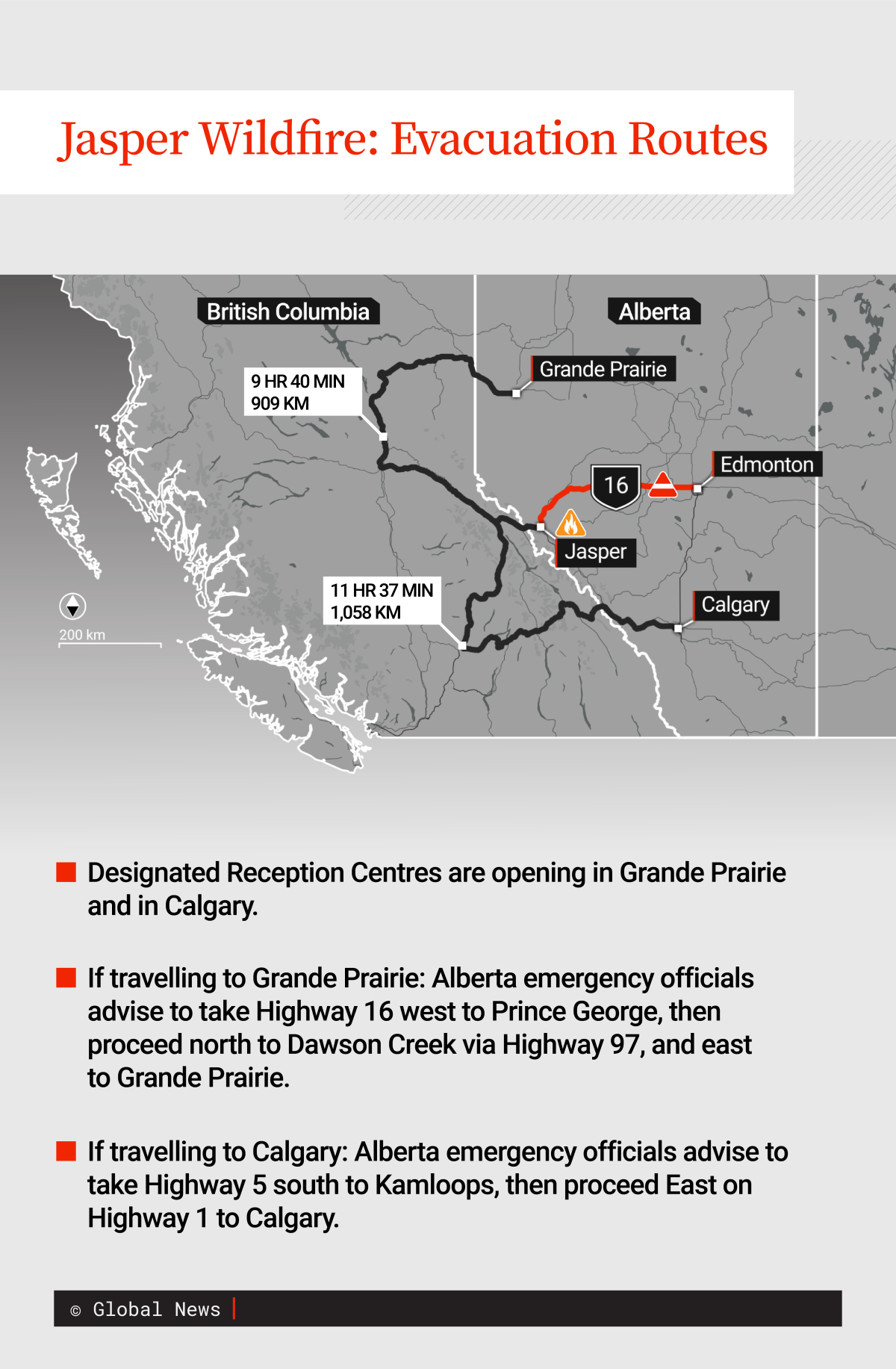Everyone in Jasper and Jasper National Park in Alberta has been asked to evacuate as of late Monday night, as a fire approaches the community.

Experts say there is a list of things people should be prepared to grab quickly as they leave their homes for safer communities and designated reception centres.
“Everyone now is in the process of evacuating the town and all the outlying accommodation, campgrounds, every other structure and facility in Jasper National Park is under evacuation,” Jasper Mayor Richard Ireland told Global News on Monday night.
The emergency alert initially said the fire was expected to reach the community in five hours, or around 3 a.m. Tuesday, but was later updated around 11 p.m. to clarify that everyone in the community needed to be out by then.
So what should you bring if you need to flee?
What to bring when evacuation orders hit
FireSmart Canada recommends having a “ready to go kit” or an emergency kit ready ahead of time if you live in a vulnerable community. This kit should include things such as cash, a portable radio, prescription medications, eyeglasses, a change of clothes, pet food, flashlights and batteries.
The Municipality of Jasper’s official evacuation guide says evacuees should have six litres of water per person in their kits, along with a copy of their emergency plan, including emergency contact numbers.

Get daily National news
The guide also recommends carrying your prescription record from your pharmacy, a three-day supply of non-perishable food per person, an extra set of car keys and a first aid kit. The kit should also have copies of important documents like birth certificates, passports, insurance and bank records.
However, if you are unable to grab documents before you leave, you can contact Immigration, Refugees and Citizenship Canada (IRCC) for free replacement of documents such as permanent resident cards, Canadian citizenship certificates, Canadian passports and other travel documents that are lost, damaged, destroyed or inaccessible due to wildfires.
Additional supplies people should consider carrying, according to the Jasper evacuation guide, are candles and matches, toiletries and personal hygiene products, hand sanitizer, toilet paper and garbage bags.
People should also consider, the guide says, carrying activities and toys for children to keep them occupied on the road, along with basic tools and duct tape for emergencies.
A small fuel-operated stove that fits easily in your car could also go a long way in emergency situations. Last-minute things that people can carry include a wallet, identification, credit cards, cash, a cellphone and a charger.

Checklist for your home/property
FireSmart Canada also recommends turning off air conditioning, water and electricity before you leave, if there is time to safely do so, and closing all doors, garage doors and windows.
If weather seal or doors have gaps, seal them with duct tape if possible.
If you store cardboard boxes and other easily ignited materials near a vent in your attic or crawl space, move them as far away as possible from vents.
“Another option is to place tape over vent(s) at these locations. Be sure to remove tape when you return home,” the FireSmart guide says.
The Jasper guide says to shut all your doors and windows before you leave, remove window shades and curtains, and close metal shutters if you have them.
Any furniture near doors and windows should be moved to the centre of the room, gas should be turned off at the meter and pilot lights should be turned off. All heating and ventilation systems should be turned off.
Any loose items outside the house, like patio furniture, children’s toys or trash cans, should either be brought inside the house or kept away from buildings and vegetation. Propane tanks should be turned off and propane barbecues should be kept away from buildings.
The town says residents should leave their garden hoses connected in case firefighters need to use them, however, they shouldn’t leave sprinklers on or water running as they can affect critical water pressure. Exterior lights should be left on.
FireSmart Canada says you should also address the outside of your house, such as by removing leaves, pine needles and other debris from your roof and gutters. You should also mow the grass and clear dead leaves, plants and weeds within 10 metres of your property.
“Maintain a 1.5 metre non-combustible zone around your home and deck by sweeping or raking down to mineral soil, rock or concrete,” the FireSmart guide says.
Officials also say to monitor announcements and alerts closely and keep track of where the evacuation zones in your community are.
— with files from Global’s Karen Bartko










Comments